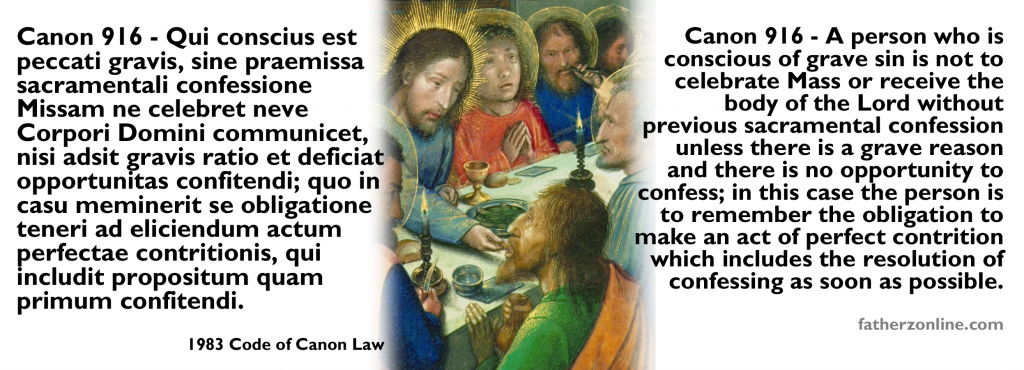 From a reader…
From a reader…
One of the requirements for receiving communion, besides being in the state of grace, is being “properly disposed” to receive. This is something that never gets talked about. How exactly should we discern whether we are “properly disposed,” and what kind of things make one not properly disposed?
We are persons who have both body and soul.
Our proper disposition for reception of Holy Communion should be both spiritual and physical.
In the spiritual category, we should be reasonably sure that we are in the state of grace. We should not be aware of any mortal sins, unconfessed and unrepented and unshriven. It may be possible for a person to make a “perfect act of contrition” and then go to Communion, with the intent of making one’s confession as soon as possible. This is laid out in can. 916:
A person who is conscious of grave sin is not to celebrate Mass [that’s obvious for priests] or to receive the Body of the Lord without prior sacramental confession unless a grave reason is present and there is no opportunity of confessing; in this case the person is to be mindful of the obligation to make an act of perfect contrition, including the intention of confessing as soon as possible.
This canon allows for Communion in a truly exceptional situation. Note that there must be a “grave reason” for receiving Communion and there is no opportunity to make a confession.
Is there today perhaps so much emphasis on every person always receiving Communion at every Mass that we have lost sight of the fact that it is okay not to receive even if you could?
In any event, a “perfect act of contrition” is not to be bandied about lightly, as if it were as easy as pie.
In the physical category, we have to attend to the Church’s law about the Eucharistic fast. Unless one is ill, etc., the law says that we should fast from food and liquids (other than water) for one hour before reception of Holy Communion. Since most Masses last long enough that the moment of Communion can arrive some 30-60 minutes after the beginning of Mass, the one hour Eucharistic fast is hardly serious. If you are at some grander Mass for a feast or occasion, you could stuff your pie-hole with Krispy Kremes on the way up the stairs into church and still go to Communion. That’s obeying the letter of the law and we have to say that it is sufficient for disposition. If someone wants to fast more, that’s great! But the law says one hour.
That’s for the interior physical person. How about the exterior physical person?
The CCC also speaks to our outward appearance and demeanor.
1387 To prepare for worthy reception of this sacrament, the faithful should observe the fast required in their Church. [That’s the inward.] Bodily demeanor (gestures, clothing) ought to convey the respect, solemnity, and joy of this moment when Christ becomes our guest. [That’s the outward.]
So, it does matter how people dress for church. We don’t all have to dress in perfect formal wear. But we have to do our best. You can tell when people are trying and when they aren’t. There is also the matter of bearing. Slouching in the pew like partially filled sack of lentils is not the proper dis-position for preparation for Communion. Shuffling forward in a distracted way and sticking your hand out as if reaching for a movie ticket or your change at the grocery store is not proper dis-position.
Let each person make a careful examination of conscience about disposition, inward and spiritual, outward in dress and gesture.
Whoever, therefore, eats the bread or drinks the cup of the Lord in an unworthy manner will be guilty of profaning the body and blood of the Lord. Let a man examine himself, and so eat of the bread and drink of the cup. For any one who eats and drinks without discerning the body eats and drinks judgment upon himself. (1 Corinthians 11:27-29 – RSV)
BTW… I once made a mug with the text of can. 915, which concerns the the distribution of of Communion to people who are publicly in a situation wherein scandal is given by Communion being given to them. However, can. 916 concerns the state of soul of the person when the details of sin or behavior are not necessarily known. This canon concerns the recipient’s responsibility, whereas can. 915 regards the minister’s responsibility. So, I determined that I needed to make another mug for can. 916.
For example:




































I’ve wondered about this in relation to my kids misbehaving during mass. I at tines get very distracted and upset and wonder if I should receive.
Speaking of Holy Communion – I hope there is a priest out there somewhere who can get air time on Fox Business News’ Lisa Kennedy Montgomery’s show. Last night (7/10) she took the last few minutes of her show to castigate Pope Francis for not permitting gluten free bread to be distributed at Holy Communion. She says she’s Eastern Orthodox – apparently they allow gluten free there – and can’t see why the Pope can’t do the same thing. The reason Ms. Kennedy gives is that one can’t consume the Body and Blood of Christ unless one receives both species. She thinks that the Body/Host alone or the Blood/chalice alone doesn’t contain all of Jesus – that one has to consume both species to have the whole Person. I guess that’s how Eastern Orthodox think and she mistakenly thinks that Roman Catholics hold this view too. (She adds in the predictable thought that this would help to bring her church and our church closer together.) This little commentary has gone out to millions of viewers and it needs to be corrected.
What about for those of us with young children who are sometimes (ahem) distracted during mass and unable to focus properly. On occasions when my daughter has been particularly unruly, I’ve found myself so distracted by constantly trying to coral or correct her, and even so frustrated and angry, that I felt I should abstain from communion. Should one abstain in such situations?
I was always taught that your disposition of heart should not be angry with your family, etc., in a serious way. (Unless it was righteous anger, which was not our problem usually.) So you had to make up by the Sign of Peace.
I don’t know if parental exasperation ever gets to the heights of anger that “He’s looking at me!” could cause between siblings!
Re: distraction, the Church traditionally has been really understanding about mothers or fathers caring for kids. I mean, you are doing your vocation right there. Like singers, you are busy giving away your gifts, not necessarily enjoying them yourself. So you are doing something mystical and on topic, even if the connection to Mass is not as obvious.
‘Is there today perhaps so much emphasis on every person always receiving Communion at every Mass that we have lost sight of the fact that it is okay not to receive even if you could?’
Perhaps also equally annoying is that those not eligible to receive Communion are invariably expected to receive a blessing.
‘If you are at some grander Mass for a feast or occasion, you could stuff your pie-hole with Krispy Kremes on the way up the stairs…’
Honestly, Fr, comments like these are what help make your blog so great. Even when discussing some – quite frankly – depressing things, you always end up putting a smile on my face somehow. In these difficult times, that truly counts for something.
The canon as written forbids one who is conscious of a grave sin (peccati gravis) from receiving communion licitly. However, this seems to go beyond somewhat beyond the divine law that only mortal (not just grave) sin absolutely forbids one from receiving communion (ST III,80,iv). Does this canon actually forbid those who are conscious of grave sins but believe them not to be mortal from receiving the Most Holy Eucharist? In my own experience, I have to say that before the reception of Communion the temptation to rationalize away the mortal character of any grave sins can at times be strong, whether justified or not. Not receiving when conscious of any grave sin is probably prudent practice, as one is generally a poor judge of one’s own soul, but does this canon actually forbid this?
Freedom from mortal sin and compliance with the minimal Eucharistic fast are not the only criteria for determining one’s disposition to receive communion. One should not partake of the Holy Mysteries if angry or upset. I would argue that the manner of celebrating the Eucharist can affect one’s disposition. I, for one, avoid receiving the Eucharist if the service is rushed or if there is serious liturgical abuse — not because the Lord is not present in the sacred species, but because I lack the proper disposition to receive the Lord Himself.
As an Eastern Catholic, I often find the Latin rite Mass over before I am ready to receive. [Novus Ordo, I suspect.] In my part of the world there seems to be an embargo on use of the old Roman canon. There is often a frenzy of activity that impairs my ability to concentrate on what is happening at the altar. These things affect my interior disposition.
If we misbehaved during Mass, my parents never became angry. One of them simply gave us “The Look.” It was prolonged eye contact with raised brows, pursed lips, and widened, somewhat blazing eyes. We knew the words that went with it, without their having to say them: “Do you want to go out to the car and get your bottom warmed?” Which meant a spanking.
Settled us right down, really quickly, after the first couple of times we were taken to the car and had our bottoms warmed. And when “The Look” was finished, my parents serenely returned their attention to the celebration.
Worked like a charm, and little anger.
Curley, I would think that being distracted and upset is the normal human condition.
Thanks for the clarification Father, mule steer, my understanding is that it forbids receiving if aware of grave sin. Like you said it’s easy to try and rationalize how it wasn’t ‘mortal’ and therefore you can receive. However if you do receive like that it’s a lovely opportunity for the devil to come and torment you about it later, so just don’t give him the opportunity in the first place. I just treat all grave sin as though it’s mortal and it’s given me a great deal of peace of mind. Besides I’ve always adhered to the idea that every good confession you make helps someone struggling with theirs, and just the visual of someone not receiving can help remind people that sometimes you shouldn’t. As for grave circumstances I always thought it was danger of death, ie war torn area, sinking boat etc. Thank you, and I’m totally open to correction here people.
I empathize mightily with jfk03, at least as interpreted by Fr. Z. The intrinsic misdirection of the Novus Ordo, as well as the endemic commotion and Eucharistic sacrilege perpetrated at most celebrations of it, do not enhance my disposition to receive. That, as much as anything, makes the restoration of the Traditional Mass a personal imperative for me.
Pingback: VVEDNESDAY CATHOLICA EDITION | Big Pulpit